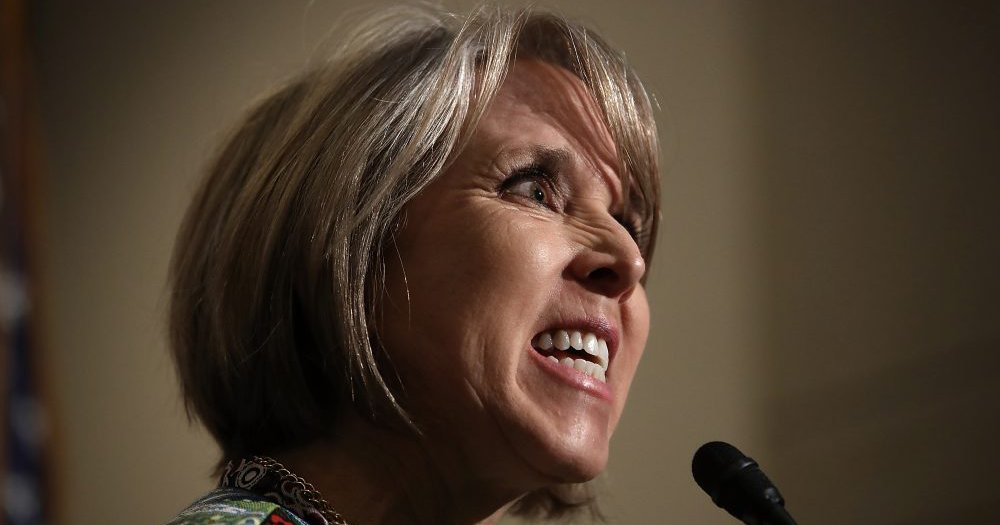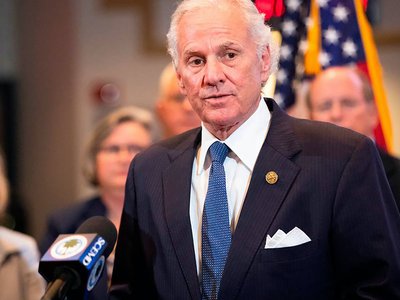Election Day could be designated a New Mexico state holiday, voting rights could be restored to those convicted of felonies, and 16-year-olds could be permitted to vote in local elections, among other initiatives the governor is proposing to lawmakers.
On the anniversary of the Jan. 6, 2021 attack on the U.S. Capitol, Gov. Michelle Lujan Grisham rolled out a raft of proposals on elections and voting rights as a key legislative goal for the 2022 session.
Along with Secretary of State Maggie Toulouse Oliver, Lujan Grisham detailed election items for which they will seek passage during the 30-day session that begins Jan. 18.
Lujan Grisham spokesperson Nora Meyers Sackett said legislative sponsors would be finalized soon, and that the proposals have the support of legislative leadership. The governor, a Democrat, enjoys Democratic majorities in both the state House and Senate.
Citing the events of a year ago, when supporters of President Donald Trump stormed the Capitol in Washington to disrupt finalization of results of the 2020 presidential election, Lujan Grisham said in a statement, "it is more important than ever to safeguard access to the ballot box. While voting rights are under attack across the country, New Mexico is taking every action to protect and expand them.”
Lujan Grisham is running for a second term as governor in the Nov. 8, 2022 election.
Toulouse Oliver contrasted the proposed legislation with laws passed in several other states that tighten restrictions on voting registration or ID requirements, reduce poll access or early voting, among other measures.
“Even as we’ve seen attempts around the country to make voting more difficult for eligible voters, here in New Mexico we continue to be a leader in how to balance the demands for voter access with the needs of maintaining our high levels of election security,” Toulouse Oliver stated in the written announcement. “This legislation now gives us the chance to pass one of the most powerful voting rights bills in our state’s history."
Toulouse Oliver, also a Democrat, has served in her office since winning a special election in 2016, and was elected to a full four-year term in 2018.
What's in the proposal
The items detailed in Thursday's announcement consist of:
-Extending early voting, making Election Day a holiday, and permitting residents as young as 16 to vote in local elections.
-Restoring voting rights to those convicted of felonies who are not incarcerated.
-Creating a voluntary permanent absentee voter list of voters who would automatically receive election ballots by mail.
-Allowing residents without a state-issued ID to register online using their Social Security number.
-Mailing ballots to voters 35 days before Election Day and accepting ballots as late as 7 p.m. on the Friday after an election, to accommodate postal service delays.
-Extending time for indigenous nations, tribes, and pueblos to request alternate voting sites.
-Allowing automatic voter registration when completing transactions at state Motor Vehicle Division offices.
-Secure electronic submissions of nominating petition signatures.
-Enabling straight-party voting on the ballot.
Voter ID, absentee ballots, straight-ticket voting
According to the Secretary of State's Office, which oversees elections, voter registration requires a valid photo identification or utility bill, bank statement, government check, paycheck, student ID or another government document. If a voter registers by mail and does not provide the identification, an ID is required the first time the registrant votes.
Otherwise, voters' identity is checked at a polling place by confirming one's year of birth and registered address. The state Republican Party and some of its candidates have repeatedly raised issues with how absentee ballots are qualified before tallying, but the Secretary of State's Office maintains that absentee ballots requested by voters are sent after county clerks verify their eligibility.
Toulouse Oliver previously sought to reinstate straight-party ballots, which allow voters to vote for all of one party's candidates by ticking a single box, in 2018 after the practice was abolished by the state Legislature in 2001.
The state Supreme Court blocked the initiative, ruling unanimously that the move would require lawmakers' approval.
Lowering the voting age
In 2013, the city of Takoma Park, Maryland became the first U.S. municipality to lower the minimum voting age to 16 for local elections. A few other municipalities followed, although a measure extending the vote to 16-year-olds in San Francisco was defeated in 2020; but in nearby Oakland, 16-year-olds won voting rights in school board elections.
The minimum age for federal elections is 18, and the most recent proposal to lower it to 16 was defeated in the U.S. House of Representatives last year.
Advocates for letting 16-year-olds vote say it is matter of fairness for citizens who are old enough to drive, work and pay taxes, and argue that it boosts civic participation, while opponents have sometimes argued individuals do not have the necessary maturity or experience at that age.
New Mexico Gov. Susana Martinez signed legislation in 2016 allowing 17-year-olds to vote in party primaries provided they would turn 18 by Election Day.






